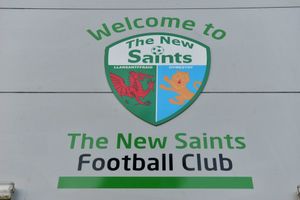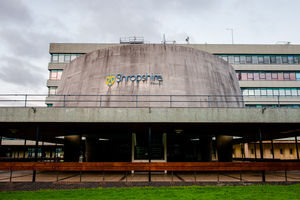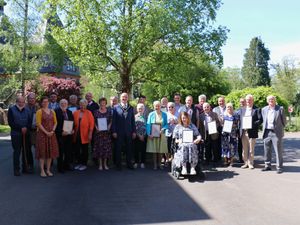The saga of the £80k TNS grant: How Shropshire Council errors meant repayments were never chased up
The circumstances surrounding Shropshire Council’s controversial £80,000 grant to TNS football club are today laid bare.

The Shropshire Star today details the contents of the council’s internal audit report into the matter.
The investigation was so sensitive that elected councillors read the report in a locked room. One council member said he was told he could face police action if the report was leaked.
The report was commissioned after concerns were raised about the circumstances of the £80,000 grant to The New Saints FC in 2012.
The payment, towards the cost of a new stand at the club, was made on condition it repaid the money over a five-year period in the form of annual £16,000 grants through the Oswestry Economic Board. But only one grant, of £10,000, was made.
Key points
The internal audit report reveals:
Shropshire Council failed to ensure repayment grants were being made, due to staff turnover and weak management structures – the report says it is not known ‘whether this was by design or accident’.
The council missed at least eight opportunities to ‘claw back’ the money after the club failed to make the payments.
Crucial records were lost when IT staff ‘inadvertently wiped’ computer files.
The council did not seek evidence that match-funding requirements had been met.
Shropshire Council is still not aware of how – or why – the body it jointly set up to distribute the grants ‘went dormant’.
Police were called to investigate allegations of fraud following a tip-off. No wrong-doing was found to have taken place.
The grant to TNS was made on the basis it would bring 20,000 extra visitors to the town in 12 months, it would lead to 20 extra events and would create at least six new jobs. But the council failed to establish whether these conditions were met.
Why the grant was given
It should have been a cause of great celebration – the minnows from a small Shropshire market town playing in arguably the world’s most prestigious club football tournament.
But Shropshire Council’s decision to help The New Saints of Oswestry Town comply with the FA of Wales and UEFA infrastructure requirements – which would in turn allow the club to compete in the UEFA Champions’ League – has turned into an embarrassment for the authority.
At the heart of the matter is the decision to give the club an £80,000 grant towards the cost of building an extra stand at the Park Hall stadium in Oswestry.

According to the council’s internal audit report, the total cost of the project was £185,000, with new build costs of £80,000, plant and equipment £100,000 and professional fees of £5,000.
“TNS would provide match funding of £105,000 against the £80,000 awarded,” the report states.
The grant was made as part of Oswestry’s allocation of money through the Market Towns Revitalisation Programme.
The grant was given on the understanding that the club made cash contributions equivalent to the amount that would have to be repaid, in the form of grants to be agreed by the Oswestry Economic Board, which was administered by Oswestry Town Council and supported by Shropshire Council officers.
The grant was awarded on May 28, 2012, with the following conditions:
It would create six full-time jobs within 12 months.
It would deliver a minimum of 20 additional events within the first year.
It would bring 20,000 extra visitors to the town over the same period of time. It was the responsibility of the club to provide evidence the latter two conditions had been met.
The club would provide grants of £16,000 per annum for a period of five years for purposes to be agreed by the Oswestry Economic Board, with the first payment being made on January 1, 2013.
Were the conditions met?
The report reveals that the stand was installed but the council did not confirm any of the first three conditions had been met.
The audit report, which was issued in April this year, states: “Officers confirmed that there is no project closure report to demonstrate delivery of the outcomes; their interpretation is that with the delivery of the stand these outcomes were a natural result.
“It would be expected that a project closure report would have been completed and the absence of one represents a risk.”
The grant was given to the club in two payments; £63,400 on June 13, 2012, and the remaining £16,600 on July 4 that year, with a proviso that the council would be able to ‘claw back’ some or all of the money if the club failed to meet the conditions.
Grants and repayments
Of the £80,000 due to be paid out by the club, only £10,000 was actually delivered.
Under the terms of the deal, the club would contribute towards projects identified by the Oswestry Economic Board, a joint venture between Shropshire Council, Oswestry Town Council, and various business groups.

The football club had been due to make its first grant in January 2013, and the second a year later, but no payments were made.
In October 2014, Shropshire Council issued an invoice for £10,000 in relation to the unpaid grants.
The deadline for the club to make its third grant to Oswestry Town Council, in January 2015, also passed without the payment.
However, the club did refund the £10,000 that Shropshire Council had demanded the previous year – with a payment of £4,000 made on July 17, and a further £6,000 on November 29, meaning that the invoice was settled some 13 months after it was issued.
This money was paid to Oswestry Town Council, which gave a grant to Start Up Oswestry – a club to encourage young entrepreneurs – as agreed by the joint board.
Noticed but not followed up
However, the report reveals that no further repayments were made after this time.
“There is no reference to the other outstanding payments at this time, and it is unclear why the full £32,000 due at this time was not invoiced for,” the report said.

It said neither the process for agreeing how the grant would be repaid, nor the procedure for recovering unpaid money, was rigorous enough.
“It is not possible to say whether this was by design or accident given the time lapsed and the number of senior officers now not available to explore this with,” it said
“Officers should have recovered funds from TNS, either because of the conditions of the grant, or because of the clawback arrangement by Shropshire Council.”
The report added that the process lacked a named officer who would be accountable for the matter.
“The review has identified several occasions over the same period where Shropshire Council officers had the opportunity to seek clawback of the funds and did not.
“It is unclear why this occurred, given the number of times non-repayment of the grant was highlighted since allocation in 2012.”
Oswestry Economic Board goes 'dormant'
What happened to the Oswestry Economic Board, which was supposed to allocate the grants, is also unclear.
The group was set up as a joint venture between Shropshire Council and Oswestry Town Council “to develop and promote the economic prosperity of Oswestry through a shared vision between the respective councils”.

A review of the board’s minutes showed that it met on a regular basis until July 9, 2013.
“It is unclear why the board went dormant at this stage,” the report said.
It said a discussion with Oswestry Town Council in March this year confirmed that meetings were administered by the town council, but the agenda was set and meetings called jointly by the two authorities.
Shropshire Council has since said it intends to recover the money from TNS, with the report also stating: “Under the agreement Shropshire Council reserves the right to claw back some or all of the grant where the output and deliverables set out in the application are not delivered.

“As at the date of this report, these funds have not been recovered from TNS.
“It is unclear why the funds have not been recovered earlier.”
Police probe
In December last year police were called in to investigate allegations of fraud, but no action was taken.
Spokeswoman Eleanor Harris said: “West Mercia Police has received two complaints relating to payments made by Shropshire Council.
“A proportionate investigation was carried out and it was established no criminal offences had been committed.”
TNS chairman Mike Harris said: “The full facts will soon be in the public domain.”
Lessons to be learned
The report made a series of recommendations on how such cases should be handled in future.
It says:
When an agreement is made between two parties, officers should ensure processes are in place to monitor delivery of the agreement appropriately and to act where this is not the case.
All decisions when awarding grants against set criteria should be documented and evidence retained.
All projects should require a project closure report which should be assessed by senior managers against the original brief and any gaps formally followed up before the project’s official closure.
Where match funding is involved, full evidence should be provided of spend or securing of such funds, before the council’s contribution is released.
Where funds are due as part of a grant arrangement, invoices should be raised for their receipt.
An audit of Market Towns Revitalisation Programme funding in Oswestry is underway and any learning following this will also be shared with managers.
What does Shropshire Council say?
Shropshire Council has released the following statement:
“The Market Town Revitalisation Programme (MTRP) was a grant fund of £3.5 million, made available by Shropshire Council, designed to support and stimulate economic growth in Shropshire market towns.
"The use of the grant was determined locally, with Shropshire councillors working with town and parish councils and local business organisations to ensure that a local, grass roots, understanding of need would be properly considered and so maximise the best use of funds.
“The New Saints (TNS) was awarded a grant of £80,000 from the MTRP. This was used to install a new stand to provide an additional 500 seats to comply with UEFA infrastructure criteria and allow the club to attract additional events, delivering economic and community benefit.
“One condition of the grant funding agreement with TNS was that they were required to deliver a grant of £16,000 each year, over a five-year period.
"Although this has happened in part, the onward grant payments have not yet been made in full and therefore TNS’s compliance with the terms of the grant is in dispute.
“Monies equal to the amount of the grant received by TNS should have been paid out as grants within the Oswestry area, the criteria for which was to be approved by the Oswestry Economic Board (a partnership between Oswestry Town Council, Shropshire Council and local business), thereby multiplying the benefits of the initial grant.
“Grants totalling the £80,000 received should have been paid by January 2017.
"The Oswestry Joint Economic Board ceased to operate in July 2013, before a set of ongoing criteria for the purposes of the TNS grants was adopted, although a single project had been approved for a grant of £10,000. (Please note the first grant was due January 2013 when the Oswestry Joint Economic Board was still operating. The audit was inconclusive as to why the funds had not been recovered earlier).
“The council took steps to recover funds within the terms of the grant agreement, but this was not properly followed through.
"Some of this can be explained by multiple handover of the project due to officers leaving the council, but overall management of this has not been satisfactory and does not meet our usual and expected standards.
"However, such internal matters do not affect the council’s rights to enforce the terms of the grant agreement.
“The chief executive of Shropshire Council has taken appropriate action. However, a number of officers involved with the project have left the council and it is unfair to determine whether any failure is attributable to them.
“The council is now seeking to recover funds from TNS in accordance with the terms of the grant agreement.”




